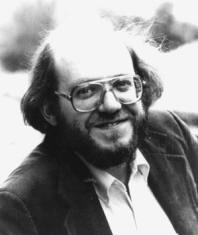Albright, William
Biography
Born: October 20, 1944; Gary, Indiana, U.S.A
Died: September 17, 1998 Ann Arbor, Michigan, USA
Country: Gary, Indiana, U.S.A
Studies: University of Michigan (B.M.1966, D.M.A.1970), Paris Cons.
Teachers: Ross Lee Finney, George Rochberg, Olivier Messiaen
Albright was born in Gary, Indiana, and began learning the piano at the age of five, and attended the Juilliard Preparatory Department (1959–62), the Eastman School of Music (1962–63) and the University of Michigan (1962–70), where he studied composition with Ross Lee Finney and George Rochberg, and organ with Marilyn Mason. He interrupted his studies for the 1968–69 academic year when he received a Fulbright scholarship to study with Olivier Messiaen in Paris. Upon his graduation in 1970 he was appointed to the faculty of the University of Michigan, where he taught until his death from liver failure in Ann Arbor, Michigan in 1998 (Griffiths 1998).
His music combined elements of tonal and non-tonal classical music (in particular the influence of Messiaen) with American popular music and non-Western music (Gillespie 2001), in what has been described as "polystylistic" or "quaquaversal" music (Chambers 1999, 32)—which makes the definition of an overall style difficult (Perone 1988, abstract). In particular, he was an enthusiast for ragtime (Bassett 1999, 28–29). In addition to his compositional and teaching activities, he pursued an active career as an organist and commissioned new works for this instrument from other contemporary composers to play on his concert tours of North America and Europe (Griffiths 1998). His hymns appear in hymnals of the Unitarian and Episcopalian Churches.
Albright's notable students include Derek Bermel, John Edgar Berners, John Burke, Evan Chambers, Chihchun Chi-sun Lee, Katt Hernandez, Gabriela Lena Frank, David Karl Gompper, Sam Davis, Evan Hause, Carter Pann, Frank Ticheli, Gordon Beeferman and Michael Sidney Timpson.[1]
William Albright was an American composer, organist and pianist. His brilliant talents enabled him to do more in his only 53 years than many performers, composers, and educators are able to do in a full career. He received early musical training between 1959 and 1962 at the Juilliard Preparatory Department, where he studied piano with Rosetta Goodkind and began theory and composition study with Hugh Aitken. In 1963, he began his college career at the University of Michigan, beginning an association that would last the remaining 35 years of his life, years that, not coincidentally, saw the composition department in Ann Arbor ascend to world-class status. His primary composition teachers included Ross Lee Finney and Leslie Bassett; he also excelled at the organ, studying with Marilyn Mason. By 1970, he would receive a doctor of musical arts in composition, with the Alliance for Orchestra, an expansion of his earlier master's composition Masculine-Feminine Part I (1967). As recipient of a Fulbright fellowship (the first of two) in 1968-1969, he spent time at the Paris Conservatoire, where he studied with one of the century's foremost composers and teachers, Olivier Messiaen. Other major teachers with whom he studied were George Rochberg and Max Deutsch.
Upon his graduation in 1970, William Albright joined the faculty at the University of Michigan. He directed the electronic music studio at the university, specializing in what was becoming known as electro-acoustic music, the blending of acoustic instruments with electronic modifications. He was widely hailed by his composition students for the way in which he allowed them to identify and give voice to their own style; he received the Distinguished Teaching Award from the university.
Even before his formal study was concluded, William Albright began to receive what would become a steady stream of commissions, awards, and honors. These included the Queen Marie-Jose Prize for his Organbook I (1967), the American Academy of Arts and Letters Award (1970), two Guggenheim fellowships (1970 and 1986), and three NEA fellowships (1976, 1981, 1984). In 1974, he was commissioned to compose for the 900th anniversary of Chichester Cathedral, producing the Chichester Mass. At UNESCO's International Rostrum of Composers in 1979, Albright was selected to represent the USA, a testament to his rapid ascent; the same year, he was composer-in-residence at the American Academy in Rome. In later years, he was named Composer of the Year by the American Guild of Organists (1993) and in 1995 was recognized by the Richard Wagner Center for outstanding choral composition.
As a composer, William Albright's music stands out for its humor and vibrant eclecticism. In such pieces as the Chichester Mass or his oratorio A Song to David (1983), his adoption or rejection of tonality always seems appropriate to the music at hand. Though Albright explored a vast variety of style, it was typically his wont to explore a specific genre within a single movement while touching on several styles over the course of the entire work. This tendency, as well as his knack for subtly alluding to but never actually quoting other compositions, is evidenced in his monumental Five Chromatic Dances for piano (1976). Over the course of a half an hour, Albright references Chopin mazurkas, boogie woogie style, and almost everything in between while exploring the range of chromatic motion. Albright widely concertized as an organist with a focus in contemporary music and a pianist specializing exclusively in ragtime music, a style that attracted and influenced he and his colleague William Bolcom. William Albright passed away due to health complications stemming from alcoholism.[2]
Works for Percussion
Bells in the Air - Percussion Trio, Orchestra
Daydream - Percussion Trio
Dream and Dance - Multiple Percussion
Enigma Syncopations - Multiple Percussion, Organ, Flute, Double Bass
Halo - Multiple Percussion, Organ
Stipendium peccati - Multiple Percussion, Organ, Piano
Take That - Percussion Quartet
References
